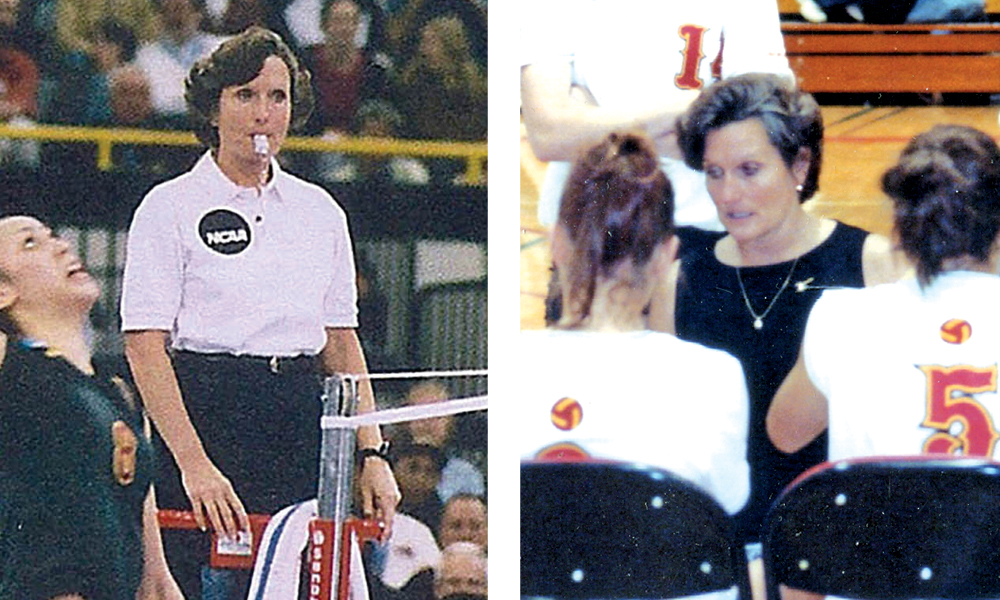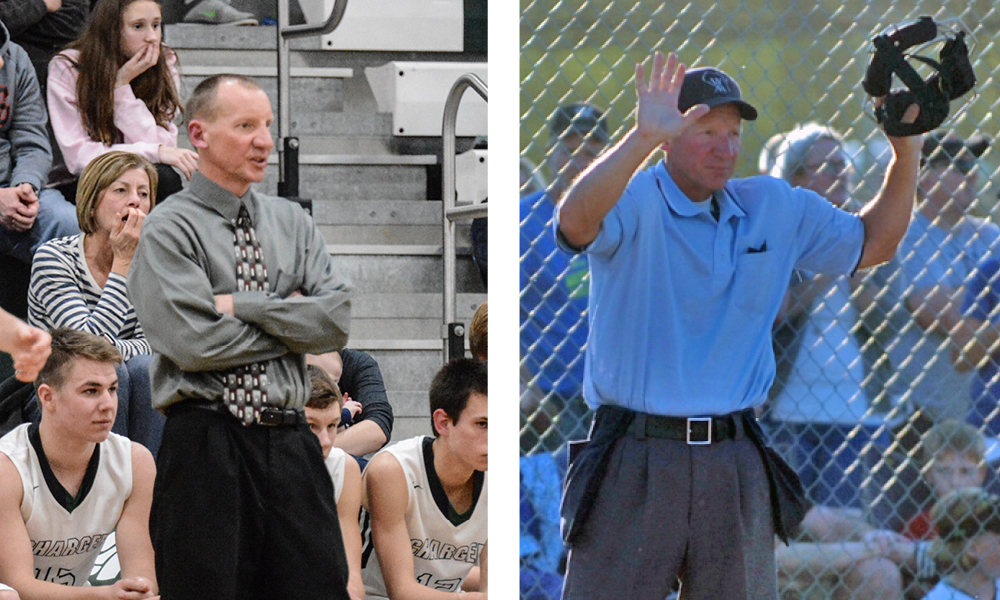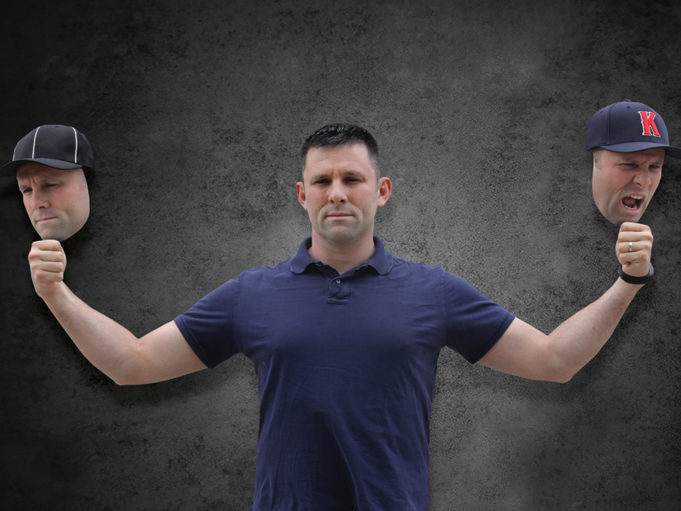We start with my story.
I was officiating with a rookie partner (who had great potential) on a middle school championship basketball game. Perfect pairing of referees — the up-and-coming new official partnered with the varsity veteran, working a big game as eighth grade girls sought to be crowned the ultimate winners of their league.
One coach had been with his squad a very short time and took them quickly to this new height.
The other coach was a longtime seasoned veteran, having been with his school for more than 20-plus years.
One little catch. That veteran coach was also a lifelong basketball and football official, who also happened to be my association’s supervisor of referees.
The game was close. Since my partner was pretty raw, I expected some possible issues from the newbie coach during the game, as everyone knew the opposing coach might think he had an “in” with the very officials he placed on this contest. Instead, the very opposite happened.
I was challenged from the second quarter onward by my supervisor, who decided to make this some odd sort of officiating clinic for me. I was nervous enough already, working a game my boss was coaching, and working with a first-year official who was being provided his own set of concerns from the get-go.
Rules were being questioned by my boss. My partner’s actions were brought up to me via this coach’s conversations. Then the coach harangued me about the other team reaching in the late third quarter, and he asked a trick question and I fell into his trap.
“Are you gonna call them for reaching or no?” he questioned.
I was frustrated. How could my own assigner, a basketball official his entire life, be treating me like this?!?
“No!” I responded. I regretted saying it immediately.
“Timeout!” he said. I granted the request.
In the huddle, loud enough for everyone to hear, the coach/my referee supervisor says, “OK girls, go ahead and reach all you want, the ref said he won’t call it!”
And he owned me.
I didn’t T him. I didn’t call the coaches together to chastise his behavior, I didn’t warn him, or any of the other solutions that came to me that night, well after the contest.
“In Kentucky, we always say folks like to wear a lot of hats, and sometimes those hats are hard to take off,” said Chad Collins, who is well aware of that. He is a longtime soccer coach (he guides U-11 girls) and is not only a collegiate soccer official, but is the state administrator for all soccer referees. You don’t get certified in Kentucky without Collins’ approval.
My supervisor couldn’t just wear his coaching hat during that game. I left the court frustrated and angry and so upset with myself. I did a horrible job for my partner (who ended up quitting just a year later), I did a lousy job for those kids, and worst of all, I didn’t treat one coach as fairly as his counterpart across the table.
Collins understands the challenge. “I know dozens of coaches who officiate who are a model of sportsmanship on both sides of the whistle, but it’s the few who cross that line or use their titles to their advantage that make it difficult across the board,” he said.
I know I mentioned a dichotomy of opinion, however, and in researching this article, found it rather quickly.
For all of the personal stories of coaches and officials who crossed the line, there were some administrators who felt this should be a non-starter. Bob Gardner is the executive director for the NFHS. His instinctive reaction was this: “I really don’t feel this has any bearing on either coach or official,” he said. “Each game is unique and it unfolds as it does. I think this is way overanalyzing something that is not an issue. We should be disgusted by all coaches who act out.”
Gardner has seen it all in his many years of sport service. He has been involved in high school athletics as a teacher, coach, athletic director and administrator.
“My perception is that as a general rule, coaches who officiate do it well,” he said. “They understand the importance of being in position and working hard.”
Collins agrees with the essence of that statement, saying, “I agree, and I think it puts everybody in an interesting situation. Coaches who are also referees know the line and when they cross it … they are very aware, since they know the rules better than most. But I’ve seen many examples of coaches who also officiate who routinely cross the line.”
“It’s impossible to take off one hat for another completely. In my case, I hold myself to a higher standard.”
— Joan Powell

Joan Powell has 40 years experience as a volleyball official, has coached, and is also an administrator as the five-term president of the Professional Association of Volleyball Officials (PAVO). She’s not only seen it all, she is the one taking the phone calls.
“There is a brotherhood/sisterhood among officials,” Powell said. “Those who wear both hats know what it is like to work in both arenas. Because those coaches who also officiate have felt the wrath of any angry coach, you would think they would empathize with their brothers or sisters. But, for some reason, we have coaches who puff up and take officials on because they want to show up the officials with their knowledge.”
That’s certainly not the expectation. Across the board, everyone contacted for this article agreed with Powell’s initial observation: “The expectation should be one of respect — shown by both parties — especially those who coach with an officiating background.”
Indeed, many coaches turn to officiating in order to help their coaching abilities. Russ Wilcox is the girls’ basketball coach at Woodsville (Vt.) High School. As a JV coach he wanted to learn more about the game, so he traveled some distance to complete an eight-class course in 2000 to certify as an official. He followed that up with some oncourt whistle blowing for some JV games until he decided to devote himself full-time to coaching.
Twelve years later, after achieving his head coaching dreams in Woodsville, he retook the course and hit the hardwood in stripes. Speaking to the Valley News, Wilcox said it was one of the best decisions he’s ever made.
“It immediately makes you a better coach,” Wilcox declared, after officiating a boys’ basketball game in Vermont. “You understand what the officials are looking at. Instead of focusing all my negative attention on the officials, I focus my positive energy on my team.”
“Often in conversation with an official I am able to ask questions which make them think and realize that I know their trade.”
— Todd Jahns

Again, there’s that ideal. Todd Jahns, who is the boys’ basketball coach at Kettle Moraine Lutheran (Jackson, Wis.) High School, has been coaching for 28 years, but has been officiating even longer, tackling Little League games since the age of 16 (way back in 1982).
“I do feel I need to hold myself to a higher standard as a coach because I officiate,” he said. “As a coach who officiates I would never berate, yell at, or try to show up an official — one, because it lacks professionalism and, two, it does no good.”
The brotherhood of officials isn’t lost on Jahns. “I see many of the officials I work with in the sports I officiate, and if I were a coach that antagonized and yelled at officials, it would be tough to work with and be in partnership with those officials later on the field,” he said.
Jahns has officiated across the spectrum, beginning with baseball and softball, before ending up on a football crew, together since 1992. They have worked three Wisconsin high school state championship games, and their bond goes deeper than that of many family units. While that makes Jahns a better coach, it also gives him the insight on how to ask questions of an official that lets the referee know Jahns is no cuckoo coach just looking for a leg up with the whistle.
“I recognize more quickly if an official is mechanically sound, in position, knows the rules,” he said. “Often in conversation with an official I am able to ask questions which make them think and realize that I know their trade.”
Unfortunately, at times, Powell noted, that knowledge can also lead a coach to let the official know in no uncertain terms about their personal experience on the court — and use that power structure to try and intimidate or sway the referee on their game. It can be quite intimidating for a fourth-year person working as a down official when the coach is a longtime national volleyball referee who has worked many major college games.
Most officials can withstand the questioning (or arguing) of a judgment call, but when the coach stands and informs the official that a rule has been clearly missed, and the coach knows that because they practically wrote the rule, it can put any official on wobbly knees for the rest of the game. Very recently, Collins faced that option.
“I had two games this past weekend, both where we could have protested and had it upheld,” Collins said. “In the first, we had a penalty kick called for us, shot was made, but the defensive team came into the area before the ball hit the net. The rules are pretty clear — the action continues if a goal is made, and the penalty is called if the penalty kick is missed. In this case, the referee penalized the defense and insisted on a re-kick. When questioned, the referee said it’s a new rule. I said, ‘It’s a new rule since the game just began?’ Naturally we missed the replayed kick.”
His second game went even worse. “One of the other players punched another girl,” he said. “This is U-11 soccer, so it’s surprising for it to happen, for a girl to just wind up and punch another girl. Easy call. The referee stopped the game, but only issued a yellow card! His response was, ‘They’re kids.’ Of course, to me as an official, I thought, ‘That’s why it should be a red — to teach them the proper rulings now.’ Luckily the other coach sat the young lady, which was great sportsmanship and let me know that kid was in good shape.”
Collins could easily have pulled the “I’m an official” card right then and there. Instead, he used his knowledge and station as the NFHS Soccer Rules Committee chair to promote the correct set of steps to follow once the games were complete, following the protocols so the officials would learn from their mistakes.
Remember Gardner’s words? “We should be disgusted by all coaches who act out.”
Collins had the opportunity and the means and didn’t act upon it.
Jahns has had such opportunities as well and instead turns within, asking only the right questions to let the official know he is a knowledgeable coach, without trying to pull the “I wear stripes” card.
Powell, too, has held herself to a higher standard, concerned about upsetting the reputation of all officials placed in a position of authority as a coach.
“I would hope that (all) coaches feel they are held to a higher standard — forgiving the errors of your players and officials — unless it becomes habitual and unfair,” she said. “I never received a yellow card in 32 years of coaching, because I held myself to a higher standard.”
Still, it happens, all too often.
Collins has removed himself from officiating any games involving a certain collegiate coach because of the way that coach acts during games, making certain all the officials on his games are aware that he is also a high-level referee.
While my supervisor and I are now partners, as he has become my mentor of more than 20 years, the game he “worked me” described earlier still sticks in my craw to this day.
It wasn’t so much his actions that upset me, as much as how I allowed the stripes hidden underneath his coaching jacket to intimidate me on the court. I imagine the feeling goes both ways, when a coach sees another coach in stripes on their game, knowing full well they’ll likely see each other over a plate of chicken wings in the near future, discussing coaching strategy.
“I think it puts everybody in an interesting position,” Collins said. “It’s impossible to take off one hat for another completely. In my case, I hold myself to a higher standard, so I’m never going to come unglued on the pitch, but it doesn’t mean I’m not going to have a difficult discussion with a referee. I just have to hold myself to a higher standard.”
The ego is a powerful thing. Many a coach is known for lacking impulse control when it comes to arguing a call, but when you add ego to the mix? The normal “you missed that one!” can quickly become “I’m a better coach than you and I’m a better official than you!” Now the quandary is in place — if it’s just a coach popping off, we are trained to control the bench (while still allowing for the emotions of the game to come through within reason).
What do you do if it’s a fellow brother or sister in blue or stripes? Especially if it’s someone with more experience than you, or in my case, a mentor and supervisor.
That’s when we have to check our own egos, because the situation can go either way, from “You are not better than me!” to “Oh my gosh, he’s so much better than I am, I can’t throw him out, he probably got the play right.”
It comes down to this: When you are a coach, you have one job. It doesn’t matter if you’re a doctor in real life, or a cop, or a fireman. Unless there’s a need for CPR, crime stopping, or fire prevention, you are just a coach. Keep your discussions to the game at hand, to the play, to your team.
And vice-versa. If you’re an official who has had wings with the coach as an officials association member in the past, everything up to that play is history. Forgotten. You also have one job — apply the rules, control the benches and players, and most of all, yourself.
The ego goes in your back pocket. Past history or other “hats” you might wear stay in the car. Do your job no matter who is in front of you. Do it the same way every time.
Who can argue against that?
Not the coach, not your supervisor, and certainly not the person in the mirror. No matter what hat that person is wearing.
What's Your Call? Leave a Comment:
Note: This article is archival in nature. Rules, interpretations, mechanics, philosophies and other information may or may not be correct for the current year.
This article is the copyright of ©Referee Enterprises, Inc., and may not be republished in whole or in part online, in print or in any capacity without expressed written permission from Referee. The article is made available for educational use by individuals.



















